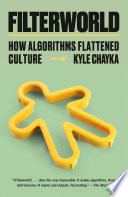

In today's digital age, individuals are bombarded with an overwhelming amount of information from various sources, including social media, news outlets, and email. This phenomenon, known as information overload, can lead to decision paralysis, decreased productivity, and increased stress. The book explores how this overload affects our ability to process and filter information effectively. It emphasizes the importance of recognizing the symptoms of information overload and understanding its impact on our cognitive functions. By acknowledging this challenge, readers can begin to develop strategies to manage the influx of information in their daily lives.
Continue readingFilters play a crucial role in how we process information. The book delves into the various types of filters we use, both consciously and unconsciously, to navigate the vast sea of information. These filters can include personal biases, social media algorithms, and cultural influences. The author argues that understanding the mechanics of these filters is essential for making informed decisions. By becoming aware of the filters we use, readers can learn to critically evaluate the information they consume and make more objective choices.
Continue readingTo effectively manage information overload, the book advocates for the creation of personal filters tailored to individual needs and preferences. These filters can include setting specific goals for information consumption, curating sources of information, and employing tools that help streamline the intake of relevant content. The author provides practical tips and techniques for building these filters, emphasizing that a proactive approach to information management can enhance productivity and improve overall well-being.
Continue readingTechnological advancements have transformed the way we access and filter information. The book discusses the role of artificial intelligence, machine learning, and recommendation algorithms in shaping our information landscape. While these technologies can enhance our ability to filter relevant content, they also pose challenges, such as echo chambers and confirmation bias. The author encourages readers to critically assess the technology they use and to remain vigilant about the potential pitfalls of relying solely on automated filtering systems.
Continue readingIn a world filled with misinformation and biased narratives, developing strong critical thinking skills is paramount. The book outlines strategies for enhancing critical thinking, including questioning assumptions, evaluating sources, and recognizing logical fallacies. By honing these skills, readers can better navigate the complexities of information filtering and make more informed decisions. The author emphasizes that critical thinking is not just a skill but a mindset that can empower individuals to engage with information more thoughtfully.
Continue readingInformation filtering is not solely an individual endeavor; it is also influenced by social dynamics. The book explores how social networks, peer influence, and community norms shape our information consumption habits. The author argues that understanding these social dynamics can help individuals become more aware of the external factors that affect their filtering processes. By recognizing the impact of social context, readers can develop a more nuanced approach to information filtering that accounts for both personal and collective influences.
Continue readingAs technology continues to evolve, the future of information filtering remains uncertain. The book speculates on emerging trends, such as the increasing role of virtual and augmented reality in information consumption. The author encourages readers to stay informed about these developments and to adapt their filtering strategies accordingly. By being proactive about the future of information filtering, individuals can position themselves to thrive in an ever-changing information landscape.
Continue readingThe reading time for Filterworld depends on the reader's pace. However, this concise book summary covers the 7 key ideas from Filterworld, allowing you to quickly understand the main concepts, insights, and practical applications in around 25 min.
Filterworld is definitely worth reading. The book covers essential topics including The Nature of Information Overload, The Role of Filters in Information Processing, Building Personal Filters, providing practical insights and actionable advice. Whether you read the full book or our concise summary, Filterworld delivers valuable knowledge that can help you improve your understanding and apply these concepts in your personal or professional life.
Filterworld was written by Kyle Chayka.
If you enjoyed Filterworld by Kyle Chayka and want to explore similar topics or deepen your understanding, we highly recommend these related book summaries:
These books cover related themes, complementary concepts, and will help you build upon the knowledge gained from Filterworld. Each of these summaries provides concise insights that can further enhance your understanding and practical application of the ideas presented in Filterworld.